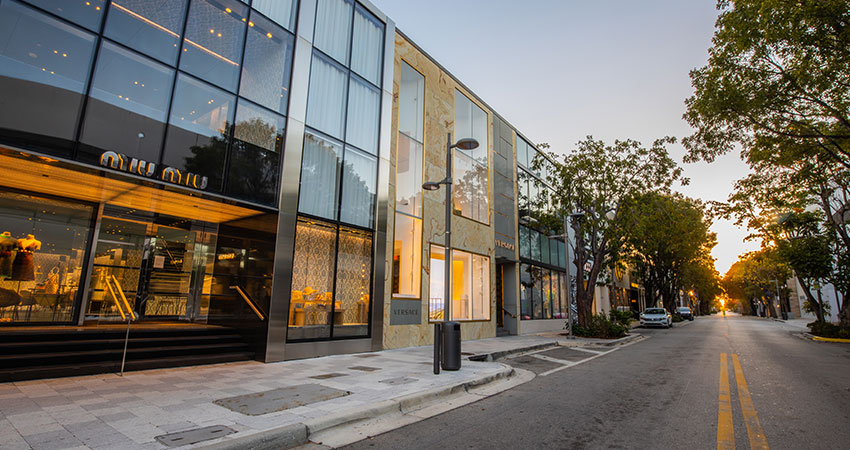Empty streets of Miami’s design district in mid-March, 2020 (credit: Shutterstock)
There’s been a lot of activity in the world of retail this week, and it’s a mixed bag as some states have begun to slowly allow businesses including retailers to reopen, working to come out the other side of the COVID-19 shutdown.
Some retailers and malls are doing the same, hoping that enough returning shoppers and their pent-up demand for goods will help with massive cash flow and viability challenges.
Among traditional retailers facing the biggest issues are Macy’s, Neiman Marcus, Nordstrom, JC Penney, Gap Inc., Kohl’s, Staples and Mattress Firm. Many stopped paying rent in April, claiming the pandemic triggered force majeure clauses in their contracts with landlords.
Legal experts say retailers are getting temporary relief, but rents will still come due at some point and the issue will be tied up in courts for some time. Landlords, especially malls are hurting themselves and count on the rental payments to carry their mortgages and service their debt.
A report from real estate services firm Green Street Advisors is projecting more than 50% of department stores anchoring malls will be closed by the end of 2021, CNBC reports, imperiling the 1,000 malls in the U.S. A departure of anchors would cause other tenants to flee or seek rent relief or early termination of lease agreements based on contract clauses.
Mall, Retail Store Reopenings
On the bright side, Simon Property Group, the nation’s largest mall operator, plans to open 49 malls in 10 states today, according to the New York Times. Security officers will remind shoppers to maintain social distancing, and food court seating will be spaced out. It’s unclear which retailers within those malls will be reopening, with Gap saying it did not plan to do so.
Macy’s, one of Simon Property Group’s tenants, on Thursday provided a six-week timeline for reopening its 775 stores, but its troubles go way beyond COVID-19. Sixty-eight stores in a few states will reopen on May 4, and another 50 on May 11.
Best Buy also announced it will open 200 of its 1,000 U.S. stores in early May on a limited basis, without giving a date.
“Customers will be able to schedule appointments with Blue Shirts or Agents for their tech essential needs,” Best Buy said in a blog post. “Since each customer’s appointment will have a dedicated sales associate, there will be a limited number of customers in the store at any one time to ensure appropriate social distancing takes place.”
Appointments can be made by phone, online, through the Best Buy app or via live chat. Customers will receive a confirmation message and a call to review the appointment process, including safety measures, and discuss their needs. Upon check in they will be provided with hand sanitizer and wipes.
Women’s apparel retailer Chico’s FAS started opening its stores this week, banking that its smaller footprint boutiques and locations of most stores in plazas instead of malls, and strict adherence to safety guidelines, will draw eagers buyers into its doors.
Online at least, consumer confidence appears to be on the upswing as stimulus checks come in, according to an analysis of 2 million transactions made on the BigCommerce platform between April 19-25. Furniture sales were up 133%, while apparel rose 23%. Other notable gains included consumer electronics (+45%), sporting goods (+33%) and hardware (+36%).
In the broader world, over a dozen states have begun some type of gradual reopening plan for businesses and the public, according to the New York Times, even as health officials caution it could cause a COVID-19 aftershock.
NRF Applauds Fed Expansion of Retailer Relief
On Thursday, the National Retail Federation applauded the Federal Reserve’s decision to expand eligibility for the $600 billion Main Street Lending Program to include larger midsize businesses affected by COVID-19.
The program was initially limited to retail businesses with no more than 10,000 employees and $2.5 billion in revenue. But the NRF told Fed Chairman Jerome Powell and Treasury Secretary Steven Mnuchin in an April 16 letter that would exclude hundreds of retailers struggling to survive. It has now been expanded to include companies with up to 15,000 employees and $5 billion in revenues.
“Expanding eligibility for this program will provide much-needed support for some of America’s most recognizable brands and their workers, who have been severely impacted by the pandemic,” NRF President and CEO Matthew Shay said in a release.
In another sign of the retail times, 1-800-Flowers said it will permanently close its 38 Harry & David stores selling signature gift baskets and gourmet fruit over the next several months to focus exclusively online, the Wall Street Journal reported.
Beyond the current situation, the move made sense as Harry & David stores only represented $46 million in 2019 sales out of $650 million in revenue for 1-800-Flowers food and gifts division. About $509 million came from ecommerce.
Even as its doors remain closed, VF Corp., parent of retailers The North Face and Vans, said it is increasing pay for distribution center workers in the U.S. and Canada through July, according to MarketWatch. It is also extending pay and benefits to furloughed store associates across North America through May 30.

